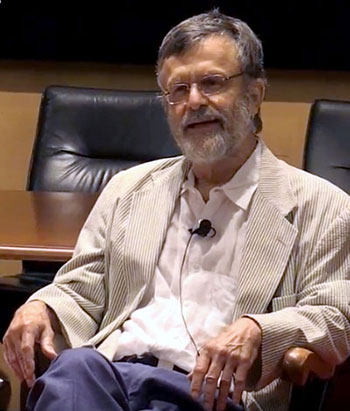Today, Pavel Machala is the Charles E. Merrill 1908 Professor of Political Science. Fifty years ago, he was a rebellious student at Charles University in Prague—and saw the Soviet-led invasion of Czechoslovakia firsthand. At Amherst, Machala has taught many courses on geopolitics and political ideology (including “Taking Marx Seriously”). But few students know his personal story.
His Early Years

became a communist country in 1948.
In his early years, “as long as there was bread in the stores, there was progress. Progress was measured by these types of mundane things: enough shoes, socks, toilet paper. Not what type of shoes, but enough shoes.” Then, in the mid-1950s, after Stalin died, the Czech regime began “promising and delivering basic material improvements.” Among them: butter.
But by the mid-1960s, people wanted more than that. Blue jeans, for example, became symbols of freedom, banned on communist holidays. “If you wore them at May Day celebrations, you could be stopped and told you could not continue. Which was good, because you can leave!”
He and his friends would try to see how far they could go without getting into trouble, whether wearing jeans, or interrupting speeches by applauding too often. “It was a way of having fun. The worst thing about communism for me, as a teenager, was it was oppressive. It was boring.”
The Prague Spring
In 1968 Czech leader Alexander Dubček laid out a program of economic reform, using as a model Yugoslav communism, “which was based on the principle called ‘market socialism.’ The means of production, the factories and stores, would be primarily collectively owned. There would be also state supervision of the management, but the products would be exchanged through the market.”
Dubček abolished censorship. “There were new authors, journals, magazines. I felt I was in paradise,” Machala says. “There was a sense of universal joy, universal self-liberation.”
Dubček made other civil reforms, too. “Soviet leaders began to realize that what was happening was deeply threatening to the Soviet Union,” Machala says. “In retrospect, I realize there was no way the Soviets would’ve tolerated the possibilities of peaceful transition to a totally different type of communism.”
The Invasion
On Aug. 20, 1968, Machala was in Paris when he got word that the Warsaw Pact nations had invaded his country. He went right home, even bicycling through the Czech countryside because there was no other transportation.
“The closer to Prague you got, the more people were in the streets and roads. People were putting flowers into the tanks, giving flowers to soldiers, the occupiers. Women were trying to kiss them. People were using their Russian to tell them that it was a mistake. We tried to tell them that we were building authentic socialism, better socialism, with a human face.”
The Aftermath
“I soon realized that the Soviets would not leave,” he says. “The Prague Spring was over.”
He believes that an alternative was possible back then: “a third way, a non-communist way, a non-Western-capitalist way. But 19 years later, when revolutions took place that destroyed communism in Europe, the people lost any interest in a kind of humanizing socialism. They wanted the West. For them, the West was affluence.
Machala moved to the United States soon after. “I was not looking for freedom in the West. I was looking for not being bored in the West—and I succeeded. But I left behind a dream. I’m still very critical of capitalism. I’m still searching for an alternative to the world we live in.”
[This is an excerpt of the interview. Read the full interview]
